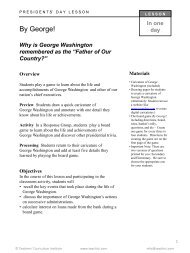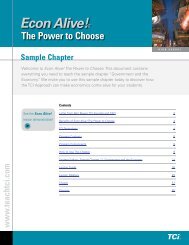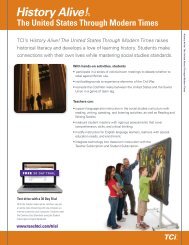Chief Executives and Bureaucracies - TCI
Chief Executives and Bureaucracies - TCI
Chief Executives and Bureaucracies - TCI
You also want an ePaper? Increase the reach of your titles
YUMPU automatically turns print PDFs into web optimized ePapers that Google loves.
From Government Alive! Power, Politics, <strong>and</strong> YouStudent H<strong>and</strong>out 13APresident Franklin RooseveltA Day in the Life of President Franklin RooseveltPresident Franklin D. Roosevelt took office in 1933 during the nation’s worst economiccrisis, the Great Depression. In 1933, some 13 million Americans—nearly one-fourth ofthe workforce—were unemployed. This unemployment had a cascading effect. The unemployedhad little to spend, so many business lost customers <strong>and</strong> had to close—increasingunemployment. In addition to losing their jobs, many people lost their savings <strong>and</strong>homes. Soup kitchens <strong>and</strong> breadlines became a common sight in most cities. Promising aNew Deal that would help the needy <strong>and</strong> promote recovery, Roosevelt entered the WhiteHouse in a l<strong>and</strong>slide victory.On March 5, 1933, President Roosevelt got to work solving the nation’s economic crisis.He focused his first day in office on dealing with problems in the financial sector. Loss ofpublic confidence in the ability of the banking industry to safeguard people’s money hadcaused periodic bank runs. Panicked depositors lined up in front of banks to try to withdrawtheir money. Those first in line got their money out. But once a bank ran out of cash,it closed its doors. By 1933, one-fifth of the banks that had been in business in the UnitedStates in 1930 had failed, <strong>and</strong> 9 million people had seen their savings vanish.Roosevelt spent most of his first day in meetings with his cabinet <strong>and</strong> selected membersof Congress. He “concluded that forty-eight different methods of h<strong>and</strong>ling the bankingsituation [were] impossible.” After checking with his attorney general about his power toact in this situation, the president decided to proclaim a national banking holiday. Thisholiday would close all banks temporarily, stopping the steady withdrawal of funds. Healso called Congress into a special session to pass the Emergency Banking Act. This law,passed on March 9, reformed the banking system <strong>and</strong> gave the federal government morepower to supervise banks.Roosevelt would explain all of his actions to the American people in his first fireside chaton the night of March 12. He hoped to restore their confidence in the banking system, <strong>and</strong>he urged Americans to do their part as well.208 Chapter 13 © Teachers’ Curriculum Institute 2, Inc.(c) Teachers' Curriculum Institute www.teachtci.com info@teachtci.com
















